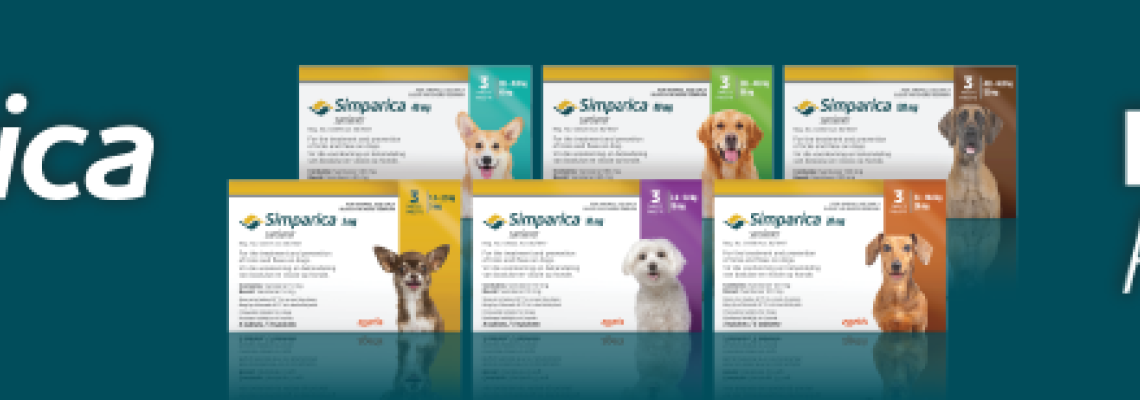Controlling Ticks, Fleas & Mites on your dog with Simparica | Product Education | AgBlogs

As dog owners, you need to ensure that you protect your dogs
from ticks, fleas and mites. These parasites can cause a range of health
problems for your dogs such as skin irritation, allergic reactions and more
serious illnesses like Lyme disease. Although ticks, fleas and mites are more prevalent
in rural areas, that does not mean that you don’t have to guard against them in
the city. These pests can be anywhere.
In this article, we will look at the different types of
common pests in South Africa and what you can do about them.
Common ticks in South Africa
There are more than 30 species of tick around South Africa
and some of the more common varieties are
1.
Amblyomma
hebraeum (bont-legged tick)
2.
Rhipicephalus
Decoloratus (blue tick)
3.
Rhipicephalus microplus (cattle
tick)
4.
Rhipicelphalus
evertsi evertsi (red-legged tick)
5.
Heamaphysalis
elliptica (tortoise tick)
These ticks can carry a range of diseases, including tick-bite
fever, heartwater, and ehrlichiosis among others. Dog owners need to take
measures to prevent ticks from infesting their dogs and potentially
transmitting diseases. An animal with tick-bite fever can die within 48 hours
of being bitten.
Common fleas around South Africa
South Africa has several types of fleas, but the most common
flea species that affect dogs and cats are
1.
Ctenocephalides
felis (cat flea)
2.
Ctenocephalides
canis (dog flea)
The cat flea is the most common flea species found on dogs
and cats in South Africa. Despite its name, it can infest both cats and dogs,
as well as other animals. The cat flea can transmit diseases such as flea
allergy dermatitis and bordetellosis, which is also known as cat scratch fever.
The dog flea, on the other hand, is less common and found in
colder regions. The dog flea can cause the same diseases as the cat flea.
Dog owners need to take measures to prevent flea infestations
as they can easily spread to your home and person.
Common mites in South Africa
Several types of mites can infest dogs and cats in South
Africa. The most common types are
1.
Demodex
mites are a type of mite that naturally live in pet hair follicles. They
usually don’t cause any problems, but in some cases, they can overpopulate and
cause a condition called demodectic mange which can cause hair loss, itch and
skin infections.
2.
Sarcoptes scabiei mites,
which are also known as scabies mites. They burrow into the skin and cause intense
itching, hair loss and skin irritation. They can be transmitted between pets
and can also infest humans.
3.
Otodectes
cynotis mites, which are a type of
mite that infests the ears of animals, causing intense itching and ear
infections. They are also referred to as ear mites.
Mites are a common parasite that can infest dogs, causing a
range of skin issues and discomfort. Some of the signs that your dogs have
mites are intense itching and scratching, skin irritation and inflammation,
hair loss, and foul odor and in some cases, you may be able to see the mites on
your dog’s skin, especially if they are in large numbers.
How to treat fleas, mites and ticks from infesting your
dogs
One of the best preventative measures for keeping your dogs
pest free is to administer Simparica Tablets. Simparica Tablets are a monthly
oral medication that is designed to protect your dog from a range of parasites.
Simparica is a broad-spectrum parasite preventive medication
and is effective against fleas, ticks and mites and works by interfering with
the nervous system of parasites, leading to their death.
How does Simparica work?
The active ingredient in Simparica tablets is Sarolaner which
interferes with the nervous system of parasites. It is however important to
note that Simparica may not be effective against all species of parasites. Some
species may be more resistant to certain medications and there may be regional
variations in parasite prevalence and susceptibility.
Simparica is effective against cat flea and dog flea, as
well as ticks such as the brown dog tick and the American dog tick. Sarcoptic mange
mites and demodedic mange mites are also controlled effectively by Simparica
tablets.
What are the benefits of using Simparica tablets?
Simparica Tablets are fast acting and start working within hours
of administration, killing fleas and ticks before they have a chance to bite
and transmit diseases.
Simparica is Long-lasting and provides continuous protection
for a full month.
The Simparica Tablets are administered easily through a
chewable, meat-flavoured tablet.
Simparica is effective against multiple parasites and
reduces the risk of transmission of diseases by killing parasites before they
bite.
The tablet is safe for most dogs and there are only a few
reported side effects such as nausea, but these reports are far and few in
between. If you know your dog is sensitive to medication it might be prudent to
contact your local veterinarian for a consultation.
How long are Simparica tablets effective?
One Simparica tablet lasts for a month, the packet comes
with 3 chewable tablets so your pet will be protected for 3 months.
The Simparica tablet is chewable and can be given directly
or hidden in another piece of food for more discerning dogs. If your dog has a
history of vomiting after taking medications, you may want to give them Simparica
Tablets with a small amount of food to help prevent nausea.
I missed giving my dog the Simparica Tablet dose, what to do
now?
If you forget to give your dog their monthly dose of Simparica
tablets, give it to them as soon as you remember. However, if it has been more
than 15 days since the missed dose, it’s best to start the monthly dosing
schedule over again. Never give your dog two doses at once, as this can
increase the risk of side effects.
What precautions should you take before giving Simparica
Tablets?
Simparica tablets are generally safe for most dogs, but
there are a few precautions you should keep in mind.
Firstly, these tablets are not recommended for puppies under
6 months of age or dogs that weigh less than 1.27 kg. Speak to your veterinarian
before administering Simparica tablets to pregnant or nursing dogs.
Finally, if your dog has a history of seizures, it is
important to talk to your veterinarian before giving them Simparica tablets as
the tablets may worsen their seizures.
To ensure maximum protection against fleas, ticks and mites,
follow the instructions on the Simparica package insert and use the medication
as directed by your veterinarian. Additionally, you need to practice good flea
and tick prevention habits, such as keeping your home clean, clearing your yard
of debris and tall grass, regularly grooming your pet and avoiding contact with
other animals that may have parasites.
In conclusion, Simparica tablets are an effective and
convenient option for tick, flea and mite prevention in dogs. They provide
fast-acting, long-lasting protection and are easy to administer. If you’re
looking for a reliable way to protect your beloved canine from parasites, talk
to your veterinarian about whether Simparica tablets are right for your furry
friend.
For every Simparica product sold, AgMarket donates R5 to the
Agri Relief Foundation which aids our farmers in South Africa, financially and
otherwise in times of distress such as flooding, drought and wildfires.
You can get your Simparica tablets at the AgMarket
online store. Simply add Simparica tablets to your cart, enter your delivery
address and contact details, and complete the checkout by choosing your payment
gateway and making your payment. The supplier will pack your order and send it
off with the courier to be delivered to your doorstep.

